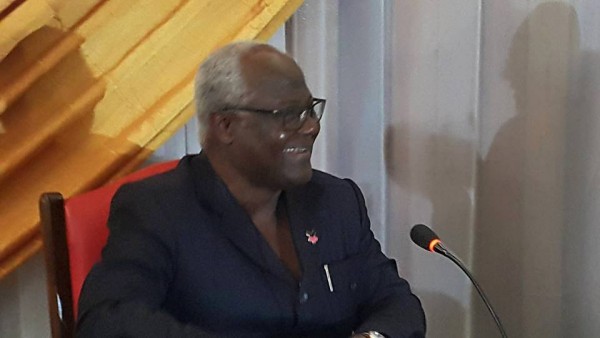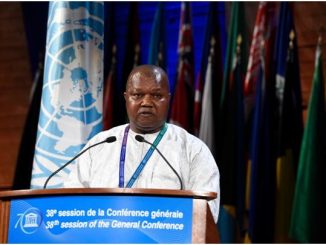
By State House Communications Unit
President Ernest Bai Koroma on Tuesday 4th August said that the private sector is a key priority in government’s post Ebola recovery plan. The president made this statement during the Bank of Sierra Leone Business Lunch at the Bank Complex, Kingtom, Freetown. The purpose of the Business Lunch was to engage with a cross section of economic actors to set the stage for the themes, issues and actions for post Ebola planning and implementation with an aim to give direction to the financial sector and galvanize stakeholders into action in post Ebola recovery.
Making a short statement at the luncheon, President Koroma explained that the financial sector will play a critical role in government’s development plans as financial services will be the conduit for most of the funds pledged for the recovery programme. He reiterated that a percentage of the money pledged will be for private sector participation in the recovery; from support to SMEs; to market women, farmers, micro finance and other forms of credit to other productive sectors. He assured of government’s continued support to the governor’s efforts at building the structures of trust necessary to sustain private sector credit flows and viability of the banking system. Getting people to benefit from the services of the sector, the president said, would unleash lots of energies and capabilities, improve on the known wealth of the country, increase the GDP and ability to attract and absorb investments, and create business to bring people into the modern economy.
President Koroma went on to note that financial inclusion would also mean greater support for microfinance institutions as important recovery vehicles for credit delivery in SMEs at household and community level. He furthered that post Ebola recovery puts strong emphasis on these types of support for SMEs, market women, youth and farmers as a means of enhancing livelihoods and creating wealth. “In the first nine months, our recovery plan emphasises on four major priority sectors – first, health; second, education; third, social protection; and revamping the economy and livelihoods by facilitating private sector recovery and growth. The second phase starts immediately after the first phase. It is a two-year plan during which we must restore Sierra Leone to the path to prosperity, as we envisaged under the Agenda for Prosperity. “Re-invigorating the private sector is a key priority in both the first and second phases of the plan,” the president pointed out.
The Governor of the Bank of Sierra Leone Mr Momodu L Kargbo commenting on the role of the banking system in post Ebola recovery and beyond said the bank has always supported growth and economic activities working with the Ministry of Finance and Economic Development to provide a stable macroeconomic environment as well as to deliver a safe and secured financial system for all. He said diversification of the economy is not only vital to increase foreign exchange flows but equally important in the broader scheme of development that the banking system will remain the focal point for meeting the credit needs of the private sector.
The Governor disclosed that a debt recovery bill is now being prepared and when enacted could be used in combination with the bankruptcy law to make borrowers live up to their contractual obligations and spruce the country’s banking habits. He said commercial banks and related institutions need to step up their functions and activities to become viable contributors to the Ebola recovery programme.
Governor Kargbo noted the bank is currently considering various digital modes of financial inclusion to broaden outreach especially in rural areas. This will include mobile money transfer, use of internet banking and other point of sale instruments. As part of the bank’s response to the recovery programme is to intensify on-going collaboration with Ministries of Trade and Industry, Finance and Economic Development, and the Office of the Chief of Staff to facilitate and enhance growth, development of SMEs to undertake commercial activities focusing on production, processing and manufacturing. He assured of the bank’s commitment to continually improve the regulatory framework to ensure a viable, robust and development oriented financial sector




